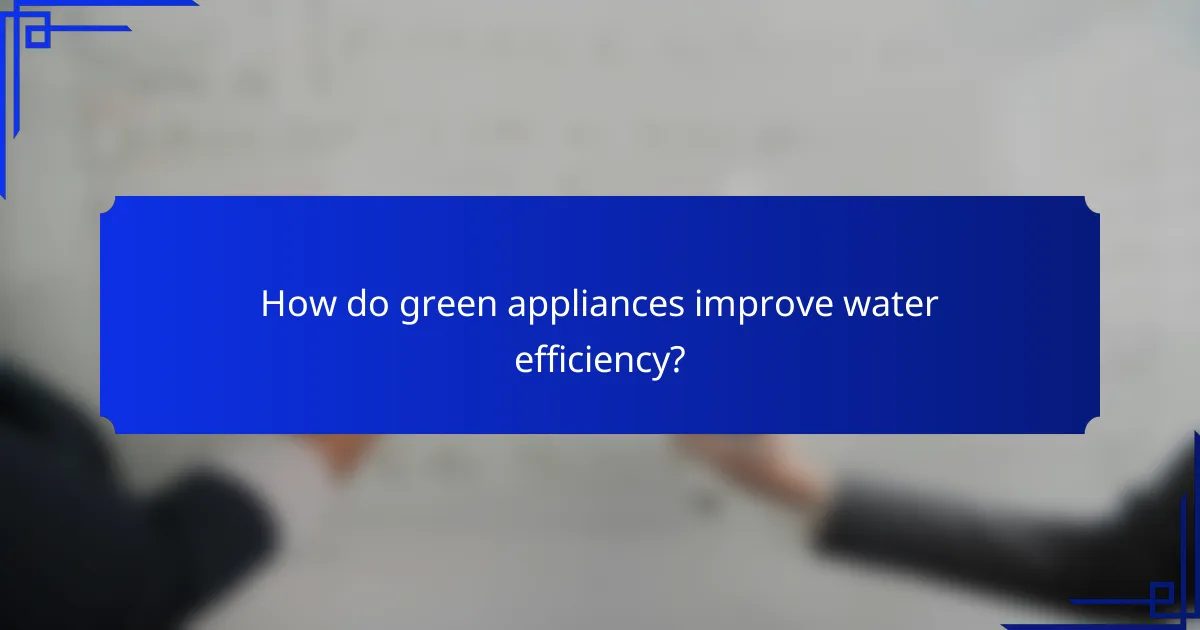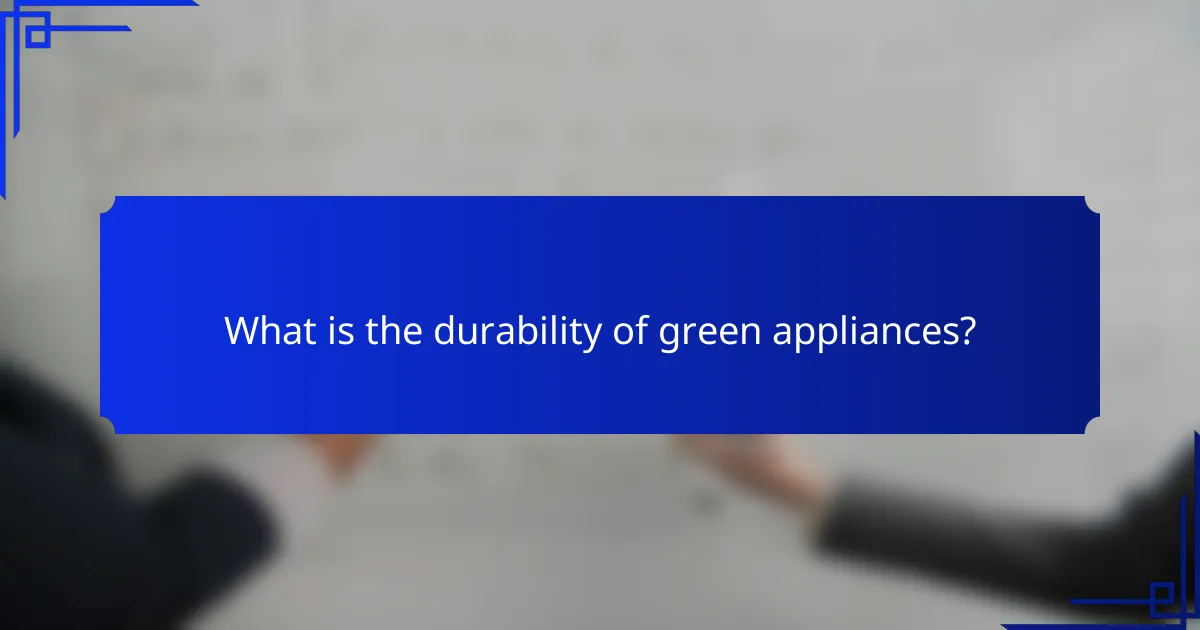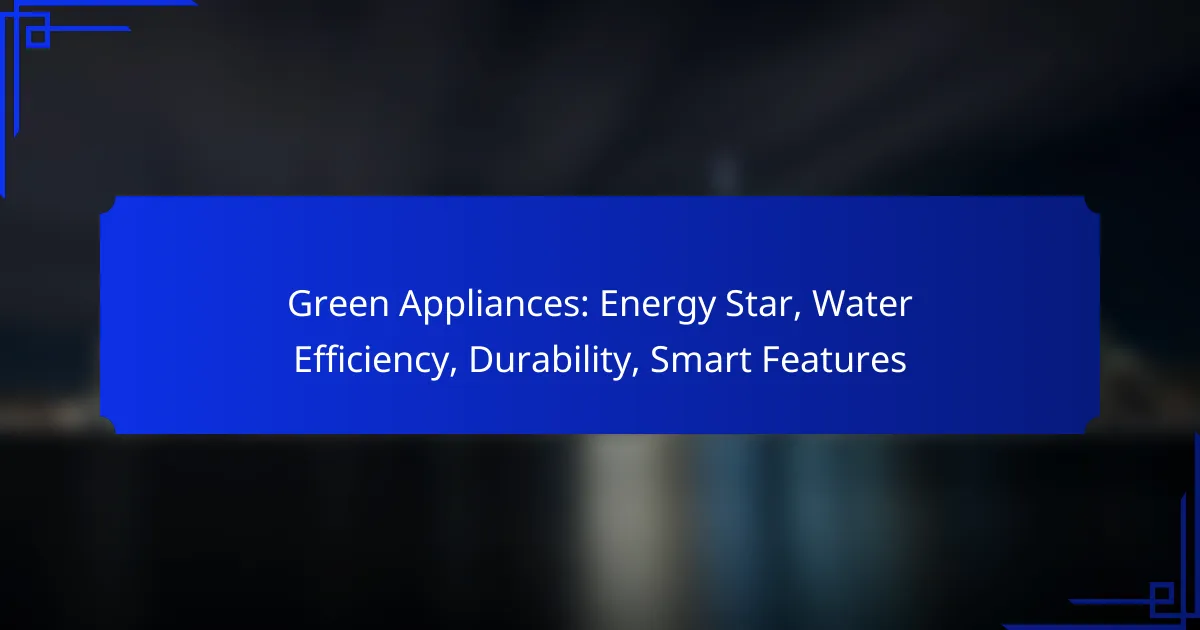Green appliances are designed to promote sustainability through energy efficiency, water conservation, and durability. Certified by Energy Star, these products help consumers save on utility bills while minimizing their environmental footprint. With advanced technologies and smart features, they ensure optimal performance without compromising on resource usage, making them a wise choice for eco-conscious households.

What are Energy Star appliances?
Energy Star appliances are products certified for their energy efficiency, helping consumers save on utility bills while reducing environmental impact. These appliances meet strict energy performance standards set by the U.S. Environmental Protection Agency (EPA) and the Department of Energy.
Definition of Energy Star
The Energy Star label identifies appliances that use less energy than standard models, promoting energy efficiency. This certification applies to a wide range of products, including refrigerators, washing machines, and heating and cooling systems.
To qualify for the Energy Star label, appliances must undergo rigorous testing and meet specific energy consumption criteria. This ensures that consumers can trust the label as a reliable indicator of efficiency.
Benefits of Energy Star appliances
Energy Star appliances offer several advantages, including lower energy bills and reduced greenhouse gas emissions. By using these products, households can save anywhere from 10% to 50% on energy costs, depending on the appliance type and usage.
Additionally, many Energy Star appliances come with enhanced features that improve performance and convenience. For example, energy-efficient washing machines often have faster spin cycles, reducing drying time and further saving energy.
Popular Energy Star brands
Several well-known brands manufacture Energy Star certified appliances, ensuring a variety of options for consumers. Popular brands include Whirlpool, LG, Samsung, and Bosch, each offering a range of energy-efficient products.
When shopping for Energy Star appliances, consider comparing models from these brands to find the best fit for your needs. Look for features like smart technology, which can further enhance energy savings by optimizing usage patterns.

How do green appliances improve water efficiency?
Green appliances enhance water efficiency by utilizing advanced technologies that minimize water usage without compromising performance. These appliances are designed to meet or exceed specific standards, ensuring they conserve water while delivering effective results.
Water-efficient appliance features
Water-efficient appliances often include features such as low-flow fixtures, smart sensors, and optimized cycles that adjust water usage based on load size. For instance, dishwashers with soil sensors can determine how dirty the dishes are and adjust the water accordingly. Additionally, many washing machines now offer eco-friendly modes that use less water and energy.
Look for appliances that have the WaterSense label, which indicates they meet EPA criteria for water efficiency. These products can save significant amounts of water annually, contributing to both environmental sustainability and cost savings.
Examples of water-efficient appliances
Common examples of water-efficient appliances include Energy Star-rated dishwashers, washing machines, and low-flow toilets. For instance, modern dishwashers can use as little as 3 gallons of water per cycle, compared to older models that may use 10 gallons or more.
Another example is high-efficiency washing machines, which can save up to 50% more water than traditional models. Low-flow toilets are also designed to use less than 1.6 gallons per flush, significantly reducing water consumption in households.
Impact on utility bills
Investing in water-efficient appliances can lead to noticeable reductions in utility bills. Households can save hundreds of dollars annually on water costs, especially in regions with higher water rates. For example, switching to a water-efficient dishwasher could save around 1,000 gallons of water per year.
Moreover, many utility companies offer rebates or incentives for purchasing water-efficient appliances, further enhancing the financial benefits. It’s advisable to check local programs that may help offset the initial costs of these eco-friendly options.

What is the durability of green appliances?
The durability of green appliances refers to their ability to withstand wear and tear while maintaining performance over time. These appliances are designed not only to be energy-efficient but also to last longer, reducing the need for frequent replacements and minimizing environmental impact.
Factors affecting durability
Several factors influence the durability of green appliances, including the materials used in construction, design quality, and maintenance practices. High-quality materials like stainless steel or reinforced plastics typically enhance longevity. Regular maintenance, such as cleaning filters and checking seals, can also significantly extend the lifespan of these appliances.
Environmental conditions play a role as well; for instance, appliances used in humid areas may require more frequent checks to prevent corrosion. Additionally, the frequency of use and load capacity can affect how long an appliance lasts.
Top durable green appliance brands
Some of the most reputable brands known for their durable green appliances include Bosch, Whirlpool, and LG. These manufacturers often incorporate advanced technology and high-quality materials, ensuring their products not only meet energy efficiency standards but also stand the test of time.
Consumer reviews and warranty offerings often highlight these brands for their reliability. Investing in appliances from these companies can provide peace of mind regarding durability and performance.
Warranty comparisons
Warranties can be a good indicator of an appliance’s expected durability. Many green appliances come with warranties ranging from one to ten years, depending on the brand and type of appliance. For example, some manufacturers offer extended warranties on major components, which can suggest confidence in their durability.
When comparing warranties, look for coverage details on parts and labor, as well as any conditions that might void the warranty. A longer warranty often reflects a manufacturer’s commitment to quality and durability, making it a key factor in your purchasing decision.

What smart features do green appliances offer?
Smart green appliances incorporate advanced technology to enhance energy efficiency, convenience, and user control. These features often include connectivity options, automated settings, and real-time monitoring to optimize performance and reduce resource consumption.
Smart technology integration
Smart technology integration in green appliances allows users to control devices remotely through smartphones or smart home systems. This connectivity enables features like scheduling, energy usage tracking, and alerts for maintenance needs, making it easier to manage energy consumption effectively.
Many appliances now support voice commands and compatibility with platforms such as Amazon Alexa or Google Assistant, providing hands-free operation and seamless integration into smart home ecosystems.
Benefits of smart appliances
Smart appliances offer several benefits, including increased energy efficiency, which can lead to significant cost savings on utility bills. By optimizing energy use, these devices help reduce environmental impact and contribute to sustainability goals.
Additionally, smart features enhance user convenience, allowing for remote monitoring and control. For example, a smart thermostat can adjust heating and cooling based on occupancy patterns, ensuring comfort while minimizing energy waste.
Examples of smart green appliances
Examples of smart green appliances include smart refrigerators that monitor food freshness and suggest recipes, as well as energy-efficient washing machines that adjust water levels based on load size. These devices often come with energy-saving modes that further enhance their eco-friendly performance.
Other notable examples are smart thermostats that learn user preferences and optimize heating and cooling schedules, and smart dishwashers that use sensors to determine the optimal wash cycle, conserving both water and energy.

How to choose the right green appliances?
Choosing the right green appliances involves evaluating energy efficiency, water conservation, durability, and smart features. Focus on products that meet recognized standards, such as Energy Star ratings, to ensure you are making an environmentally friendly choice.
Criteria for selection
When selecting green appliances, prioritize energy efficiency ratings, such as Energy Star, which indicates lower energy consumption. Additionally, consider water efficiency labels, especially for appliances like dishwashers and washing machines, which can significantly reduce water usage.
Durability is another key factor; look for appliances made with high-quality materials that have longer lifespans. Smart features can enhance efficiency by allowing remote control and monitoring, so consider models that integrate with home automation systems.
Comparative analysis of brands
Different brands offer varying levels of energy and water efficiency. For instance, brands like Bosch and LG are often recognized for their high-performing, eco-friendly appliances. Researching customer reviews and expert ratings can provide insights into the reliability and performance of specific models.
Additionally, compare warranty options and customer service reputation, as these can indicate the brand’s commitment to durability and customer satisfaction. Many brands now provide online tools to help consumers assess energy and water savings, making it easier to choose the best option for your needs.

What are the pricing ranges for green appliances?
Green appliances typically range from moderate to higher price points compared to standard models. Expect to pay anywhere from a few hundred to several thousand dollars, depending on the type and features of the appliance.
Energy Star Appliances
Energy Star appliances are designed to use less energy, which can lead to significant savings on utility bills. Prices for these appliances generally start around $300 for basic models and can exceed $2,000 for high-end options.
When considering Energy Star appliances, look for the EnergyGuide label, which provides estimated annual energy costs. This helps you compare the efficiency of different models and make informed decisions.
Water Efficiency
Water-efficient appliances, such as dishwashers and washing machines, can save both water and money. These models often cost between $400 and $1,500, depending on their capacity and features.
Check for the WaterSense label, which indicates that the appliance meets water efficiency criteria set by the EPA. This label can help you identify products that will reduce water usage without sacrificing performance.
Durability
Durability is a crucial factor in green appliances, as longer-lasting products can reduce waste and save money over time. While initial costs may be higher, investing in durable appliances can lead to savings in repairs and replacements.
Look for brands that offer warranties of at least five years, as this often indicates a commitment to quality. Research customer reviews to gauge the longevity of specific models before making a purchase.
Smart Features
Smart features in green appliances can enhance energy and water efficiency by allowing remote monitoring and control. Prices for smart appliances typically range from $500 to over $3,000, depending on the technology and brand.
When selecting smart appliances, consider compatibility with your home automation system. Features like energy usage tracking and alerts for maintenance can help you optimize your appliance’s performance and efficiency.
